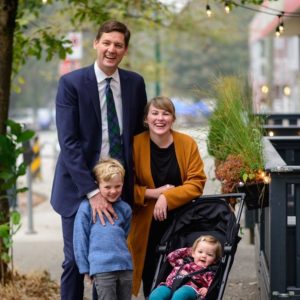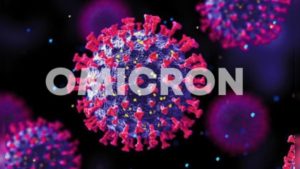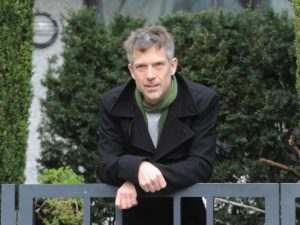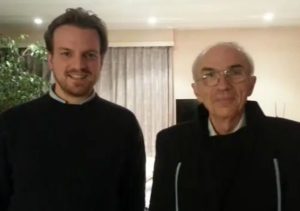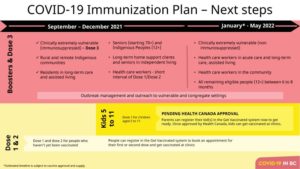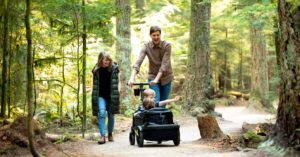
As of today, Friday, November 18, 2022, David Eby becomes the 37th Premier of the Province of British Columbia. Glad tidings for our province, and glad tidings for the British Columbia New Democratic Party, B.C.’s current sitting government.
David Eby, the duly elected three-term Member of the Legislature, who since his election to Victoria in 2013, has more than ably represented his many grateful constituents who reside in his Vancouver Point-Grey riding, as a community activist extraordinaire, and an on the ground advocate for any constituent who walks through the doors of his constituency office located on West Broadway just west of Macdonald, in the heart of the welcoming westside Kitsilano neighbourhood.
David Eby and David Eby alone will salvage a somewhat long in the tooth BC New Democratic government, as a steady as she goes but decidedly activist Premier intent on getting things done for all British Columbians, resident in the North, throughout the Interior, on Vancouver Island & across B.C.’s urban metropolises.
David Eby may well be the most sympathetic and authentic political figure this province has ever seen — just you wait and see — and as such represents not just the great hope of the BC NDP to retain government past the 2024 provincial election, but the great hope for all British Columbians who, over the next 24 months, will come to cherish David Eby as the once-in-a-generation inspirational leader who will lead our province through the certain-to-be challenging times ahead.
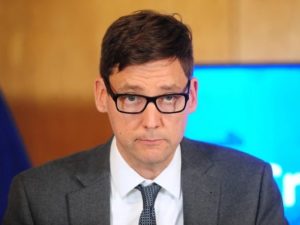
Premier David Eby has his work cut out for him, but from all reports he’s going to hit the ground running.
In an October 7, 2022 column in The Vancouver Sun, arising from an extensive poll by Angus Reid gauging the rate of satisfaction British Columbians felt for the incumbent John Horgan government, columnist Vaughn Palmer wrote …
“An opinion poll this week from the Angus Reid institute indicated the public is far from content with the NDP’s handling of major issues. On homelessness, the opioid crisis, labour shortages and seniors care — the verdict was negative: “poor/very poor job.”
Those responding to the survey gave the NDP government a 73% negative rating on health care, a 77% negative on dealing with the cost of living, and an 85% negative rating for its handling of housing affordability.
New Democrats should be worried about what happens when Premier John Horgan, the most popular British Columbia leader in decades, exits the Premier’s office, leaving behind only public discontent over how the government has been handling the major issues.”
Then Premier-designate David Eby’s response to the Angus Reid poll, and Mr. Palmer’s concerning column in The Vancouver Sun?

Premier David Eby releases 100-day plan for B.C. housing, health & safety
An article in the Canadian Press reads: “The B.C. New Democrats’ newly minted leader and Premier is promising “significant action” to bolster the province’s affordable housing, health-care system, public safety and environmental policies.”
At a press conference, David Eby rolled out his plans for his first 100 days.
“I’m setting down a marker today on these priorities for our government: housing, health care, the environment, public safety,” he said at a news conference.
“At the end of those 100 days, you will have seen announcements (and) activity from a government focused on delivering results for British Columbians that set out the groundwork for how, in the next two years, we are going to deliver significant change for British Columbians.”
Eby campaigned for leader on a housing plan that includes a $500-million fund to provide grants to non-profits & First Nations to buy rental properties, pledging to fast-track approvals & construction of multi-family housing projects.
On the health-care front, Premier Eby said his government will be looking at the process used to assess people with international credentials “to get them working as quickly as possible” to address a dire need in the health system.
When it comes to concerns over public safety, Premier Eby said there are issues where the criminal justice system is not responding they way it needs to.
“You will see action from our government on this issue. But what you will see is action that actually addresses the core issue that is causing so much chaos in communities: the issues of mental health, addiction, homelessness, and the need to intervene and break the cycle that people are involved in,” he said.
Mr. Eby is also promising to redirect fossil fuel subsidies to clean energy.
“British Columbians are really clear, we cannot continue to subsidize fossil fuels and expect clean energy to manifest somehow. We cannot continue to expand fossil fuel infrastructure and hit our climate goals,” he said.
One week ago, David Eby released a bold plan to take ownership of the DTES.
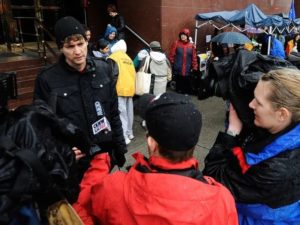
David Eby, then a lawyer with the B.C. Civil Liberties Association, speaks to reporters in Vancouver’s Downtown Eastside in 2009. Photo by Ric Ernst /PNG
The area is worse than ever, says Eby, who knows whereof he speaks. As a young, activist lawyer, Eby got his start representing the residents of the DTES, writes Vaughn Palmer in a November 11th article in the Vancouver Sun.
Instead of joining the legions of buck-passers, Premier Eby proposes that his government take ownership of the troubled area.
“The key piece that’s been missing has been a single level of government to bottom line what’s happening in the neighbourhood,” Eby declared early in his bid for the NDP leadership.
“The crisis in the Downtown Eastside is well beyond what the city of Vancouver can take on, on their own. Ottawa is too far away.”
“The opportunity here is for the province to take a leadership role and say we will take responsibility. We will co-ordinate this. We’ll work with the city. We’ll work with the feds. We’ll work with the large Indigenous population down there.”
Measures will include replacing the single-room occupancy hotels “that are burning down, that people won’t live in, and replacing them with appropriate housing,” says Eby.
He’ll also replace the sidewalk-clogging tent cities that are the area’s most obvious sign of deterioration.
“I don’t support encampments,” Eby told Richard Zussman of Global TV. “I don’t think they’re a solution to homelessness. I don’t think they’re safe for the people who live in them. I’ve seen too many fires, too many injuries. People have died.”
Another element of Premier Eby’s thinking about the crisis on the streets emerged back in August when he came out in favour of involuntary treatment for people who overdose repeatedly.
“When someone overdoses twice in a day and they show up in the emergency room for the second time, a second overdose in the same day, the idea that we release that person back out into the street to overdose the third time and die or to have profound brain injury or just to come back to the emergency room again, seems very bizarre,” Eby told Postmedia’s Katie DeRosa.
“We need to have better interventions and that could include and should include involuntary care for people to make sure they at least have a chance,” he said.
Make no mistake, Premier David Eby means to make a difference, as PostMedia’s Katie DeRosa wrote just two days ago, David Eby, as an …
“Idealist and pragmatist. Activist and member of the establishment. Workaholic and yoga dad. Fixer of the root causes of crime, housing unaffordability and a crumbling health care system, intractable issues he’s under pressure to make progress on before he faces B.C. Liberal leader Kevin Falcon in the 2024 election.
Those around him say the 46-year-old father of two is driven, laser-focused and relentless and will likely expect the same from members of his soon-to-be-named Cabinet, the swearing-in of Premier Eby’s new and revitalized Cabinet set for December 7th. He’s also not afraid to defy those he believes are standing in the way of progress, which is why he has promised to override local mayors reluctant to approve affordable housing projects.
“His approach is calm, methodical, considerate, and broad-thinking,” says Joy MacPhail, the former NDP Cabinet Minister and interim party leader, and ICBC Board Chair when the reforms were underway in 2018, who remains a mentor to Eby.”
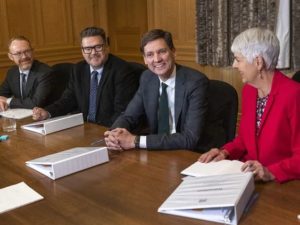
Premier-delegate David Eby and his transition team. Left to right: Chief of Staff Matt Smith; co-chair of the transition team, Doug White, chair of B.C.’s First Nations Justice Council & former chief of the Snuneymuxw First Nation; Premier David Eby; and former BC NDP leader and Finance Minister, Carole James, a co-chair of the transition team. Photo by Darren Stone /Victoria Times Colonist
David Eby was sworn in as Premier at the Musqueam Community Centre, the location a powerful symbol of reconciliation with Indigenous Peoples, Eby told PostMedia’s Katie DeRosa.
Mr. Eby took the oath of office at 10 a.m. this morning in front of Lt.-Gov. Janet Austin at the community centre on the Musqueam First Nation.
“I am excited to be taking this important step close to home where my family and the people who have always supported me live,” Eby said Tuesday in a statement.
Mr. Eby said he’s grateful to Chief Wayne Sparrow, the Musqueam councillors and the Musqueam people for hosting the ceremony in their community.
“Because of their efforts, this event will be a powerful symbol of a shared vision for a province that delivers results for all British Columbians, in close partnership with Indigenous Peoples,” he said.
The community centre at 6735 Salish Dr. in Vancouver is in the Vancouver-Quilchena riding, which is represented by B.C. Liberal Leader Kevin Falcon. David Eby, 46, is the MLA for the neighbouring riding, Vancouver-Point Grey.
Moving the swearing-in ceremony to Vancouver is also an indication Premier Eby will likely conduct more government business from Vancouver, to be closer to his family. Mr. Eby’s wife, Dr. Cailey Lynch, is a family physician, and the happily married couple have two children, 8-year-old Ezra and 3-year-old Iva.
